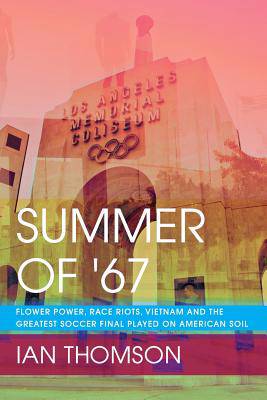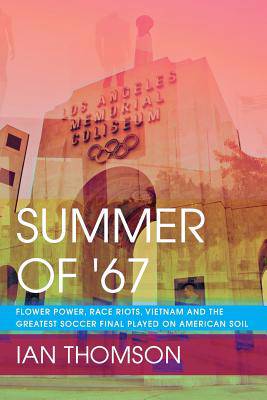
- Retrait gratuit dans votre magasin Club
- 7.000.000 titres dans notre catalogue
- Payer en toute sécurité
- Toujours un magasin près de chez vous
- Retrait gratuit dans votre magasin Club
- 7.000.0000 titres dans notre catalogue
- Payer en toute sécurité
- Toujours un magasin près de chez vous
Summer Of '67
Flower Power, Race Riots, Vietnam and the Greatest Soccer Final Played on American Soil
Ian Thomson
Livre broché | Anglais
20,95 €
+ 41 points
Description
On July 30, 1966, nine million American viewers tuned in to watch the FIFA World Cup Final on the NBC channel. It was the first stand-alone broadcast of a soccer game on U.S. network television, and England's pulsating extra-time win over West Germany left the audience enthralled.Within weeks, two groups of North American sports promoters were seeking to tap into soccer's newfound popularity by launching rival professional leagues - the National Professional Soccer League and the United Soccer Association.The inaugural USA tournament featured 10 European teams and two from South America jetting across the continent from the end of May to mid-July. Aberdeen, Dundee United and Hibernian arrived from Scotland. Stoke City, Sunderland and Wolverhampton Wanderers represented England. Top Serie A side Cagliari came from Italy boasting Italian national team forwards Roberto Boninsegna and Luigi Riva. ADO Den Haag traveled from the Netherlands, Rio state champions Bangu from Brazil and Cerro from Uruguay. Glentoran and Shamrock Rovers, two semi-professional clubs from north and south of the Irish border, completed the line-up.Legendary Wolves striker Derek Dougan led his team to the Western Division crown under the guise of the Los Angeles Wolves. Aberdeen, representing the Washington Whips and boasting U.S. President Lyndon B. Johnson as a season ticket holder, won the Eastern Division with a young team including future Manchester United captain Martin Buchan and American college soccer coaching guru Bobby Clark.The Wolves and the Whips produced an epic encounter at the Los Angeles Memorial Coliseum on July 14, 1967 to determine who would become the first, and ultimately only, United Soccer Association champions. It was the greatest soccer final played on American soil."Summer Of '67" charts the story of the tournament's creation and demise, and recalls the experiences of its participants including Buchan, Clark, former Hibernian and Liverpool midfielder Peter Cormack, Stoke legend Terry Conroy and ex-Wolves winger Terry Wharton.Sixteen players from eight clubs share their memories of the capers, the gimmicks, the celebrity brushes and the games that combined to provide them with the trip of a lifetime.
Spécifications
Parties prenantes
- Auteur(s) :
- Editeur:
Contenu
- Nombre de pages :
- 300
- Langue:
- Anglais
Caractéristiques
- EAN:
- 9781490596266
- Date de parution :
- 12-07-13
- Format:
- Livre broché
- Format numérique:
- Trade paperback (VS)
- Dimensions :
- 152 mm x 229 mm
- Poids :
- 439 g

Les avis
Nous publions uniquement les avis qui respectent les conditions requises. Consultez nos conditions pour les avis.






